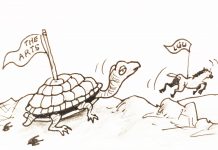One early morning after a downpour, as I drove past the national highway, a dead dog was lying by the roadside—its body torn open, its blood washed thin by the rain. A few meters away, another lifeless cat lay sprawled near the gutter. That sight, as common as it has become, always makes me question this supposed “sixth sense” that animals are said to possess—the mysterious instinct to detect danger before it strikes.
I’ve heard people swear that before an earthquake, the chickens grow restless, the dogs howl, and the birds vanish from the trees. In the countryside, these stories are told with an air of certainty, as if nature itself whispers its secrets to animals first. It’s a belief passed through generations, sometimes reinforced by coincidence—a dog barking before a tremor, or cows refusing to move before a storm. But I’ve learned that superstition and science often walk different paths. While it’s true that some animals can sense subtle environmental changes—such as vibrations, temperature shifts, or changes in air pressure—this does not mean they can always interpret these signals as a danger, nor does it mean they can always escape it.
In fact, the animal kingdom is as vulnerable as ours, sometimes even more so. When a flash flood rushes through a village, not only do people drown, but also goats, pigs, and dogs tied to posts. During typhoons, countless birds are torn apart mid-flight, and fish are hurled ashore by storm surges. If these creatures indeed have some premonitory awareness, it does little to save them. Survival often depends less on instinct than on circumstance—whether there’s a tree to climb, an opening to flee through, or a human who cares enough to untie the rope.
I don’t discount the fascinating studies that show elephants detecting distant thunder or snakes sensing tremors through the ground. Those are marvelous adaptations, but they don’t imply foreknowledge of disaster; they merely indicate responsiveness to stimuli. The danger lies not in acknowledging animal sensitivity, but in romanticizing it. When we say animals “know” what’s coming, we grant them human intuition they do not possess, turning their reflexes into prophecies and their confusion into wisdom. It’s our human tendency to explain what we don’t fully understand by cloaking it with mystique.
Perhaps the reason such beliefs persist is that they offer us comfort. We like to imagine that someone—if not us, then the creatures around us—has a head start against danger. There’s reassurance in thinking that the dog’s sudden bark or the bird’s abrupt flight is a coded warning, a way for nature to speak. It feeds our yearning for connection to something larger, to a natural order we can no longer hear directly because we’ve become too civilized, too distant from the wild. Yet, ironically, this faith in animals’ foresight masks our own failure to prepare, to learn, and to adapt.
Whenever I see dead animals on the road, I think of how unfair it is that they get blamed for not escaping what they could never predict. A dog crossing a highway doesn’t know about speeding trucks, nor can a carabao sense a bridge collapse seconds before it happens. They’re not prophets—they’re survivors in a world designed by humans, a world that often doesn’t make room for their instincts. Our roads, our noise, our concrete—all these mute whatever primal sensitivity they might have once had. And so, they perish, not for lack of instinct, but for lack of space to act on it.
There’s also the irony that we expect animals to do what we ourselves fail to do: anticipate disaster. We build homes in flood-prone areas, cut trees without thought, ignore weather warnings, and still we mock nature when it retaliates. Maybe we find comfort in believing that animals sense danger better than we do because it excuses our negligence. But no, animals die too—sometimes first, last—and their deaths remind us that nature spares no one, not even her own.
I think it’s time we stop burdening animals with mythical powers they never claimed. Instead of expecting them to foresee calamities, we might learn more by observing how they live despite them—alert, adaptive, and instinctively responsive to the world as it is, not as it might be. Their senses are tools for survival, not fortune-telling. And if there’s a lesson in their silence, it’s that danger, once it comes, spares neither the wise nor the wild. It simply arrives—and like the rain-washed carcass on the highway, it leaves behind the same, humbling truth: instinct alone is never enough.




